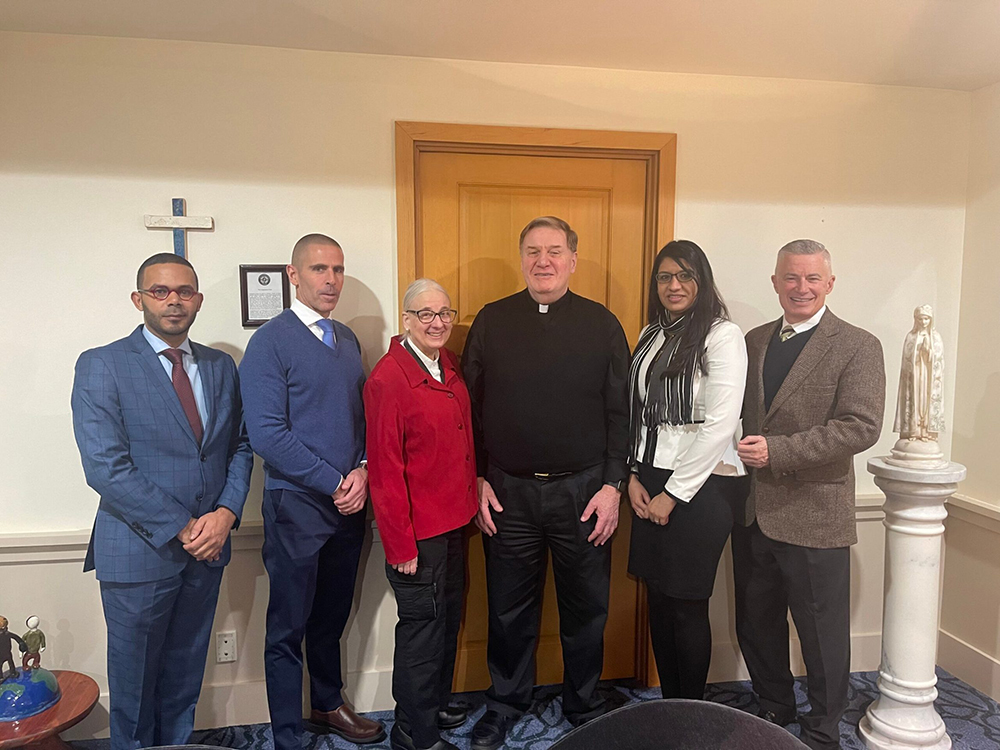
Newark — In times of personal crisis, Catholics often turn to their parish priest for help. But in the Archdiocese of Newark, the clergy are doing more than lending a sympathetic ear.
Cardinal Joseph Tobin and former New Jersey Governor Jim McGreevey teamed up last year to establish a program in which priests are trained to recognize the signs of opioid addiction and steer troubled individuals to treatment within 48 hours.
McGreevey serves as chairman and executive director of NJ Reentry Corporation (NJRC) — a nonprofit established in 2014 that helps formerly incarcerated people reenter society and find jobs. His organization signed a memorandum of understanding with the archdiocese to coordinate services, and the program launched on July 1, 2023.
The archdiocese has 212 parishes and serves approximately 1.3 million Catholics across four counties — Bergen, Essex, Hudson, and Union. McGreevey said that to date, more than a dozen priests and deacons have been fully trained.
“This has been a very productive and meaningful partnership for which we are grateful to Cardinal Tobin and the Archdiocese of Newark,” he added.
The program is necessary, Cardinal Tobin said, as the opioid epidemic gripping the U.S. has hit New Jersey particularly hard.
“The archdiocese recognizes the need for greater resources and support for adults struggling with opioid addiction who often turn to a parish seeking help,” Cardinal Tobin said. “This partnership between NJRC and the archdiocese will provide an opportunity for our brothers and sisters to receive addiction treatment when in critical need.”
The collaboration focuses on opioids due to the severity of the problem in New Jersey, McGreevey and Cardinal Tobin said. According to the New Jersey Department of Health, 3,054 people died of opioid-related overdoses in 2022, including those involving heroin and fentanyl.
However, opioid-related deaths have decreased both in New Jersey and nationwide. The number of deaths in New Jersey dropped to 2,564 in 2023, according to Department of Health figures. Nationally, opioid overdose deaths fell from 84,181 in 2022 to 81,083 in 2023, according to the U.S. Centers for Disease Control (CDC).
Still, many families in New Jersey continue to suffer from the effects of drug abuse, said Robert Carter, NJRC’s chief operating officer. He emphasized the importance of working partnerships like the one between NJRC and the archdiocese.
“I wish I had better news for you, but there is still a significant problem,” Carter said. “People need help.”
McGreevey emphasized that the sooner people can receive help, the better.
“When people are ready to take that step and change, you have to act quickly to get them the help they need,” he said.
While parishioners with addiction issues — or their friends or relatives — can approach a priest for advice, in some cases, it will be the priest who approaches the addict to offer help. McGreevey said the goal isn’t to turn priests into clinical directors but rather for the clergy to serve as facilitators.
“When people have issues or family members with issues, they often don’t know where to turn or who to call. But they do know their church pastor,” McGreevey said. “They know their priest.”
“Priests will be able to give people a card with a phone number,” he added. “NJRC has relationships with addiction treatment providers that follow clinical best practices.”
Once in contact with clinical professionals, individuals receive personalized services based on their needs, McGreevey explained.
Treatment options could include detoxification, withdrawal management, anti-craving medication induction, and residential or outpatient treatment. Additionally, some individuals may be enrolled in NJRC’s Employment Orientation program, which teaches work skills and offers job-readiness workshops.
NJRC tracks services through a database, follows up with individuals, and provides biannual reports to the archdiocese.
Father Timothy Graff, director of social concerns and parish mission and vitality for the Archdiocese of Newark, highlighted the key role that parishes can play in helping individuals overcome addiction.
“The idea behind the partnership is that when people or their family members are dealing with addiction, the question is, ‘Where can they turn?’ ” Father Graff said. “New Jersey Reentry has seen the crucial role the community plays in supporting people coming out of the penal system.”
McGreevey credited Cardinal Tobin with inspiring the partnership between the archdiocese and NJRC.
“The cardinal understands that when people are ready for treatment, the supportive power of the faith community is vital,” McGreevey said.
Father Graff expects the program to grow as more people learn about it: “Word of mouth will be key.”
For a list of local resources, please visit: dioceseofbrooklyn.org/addiction-recovery-month.
